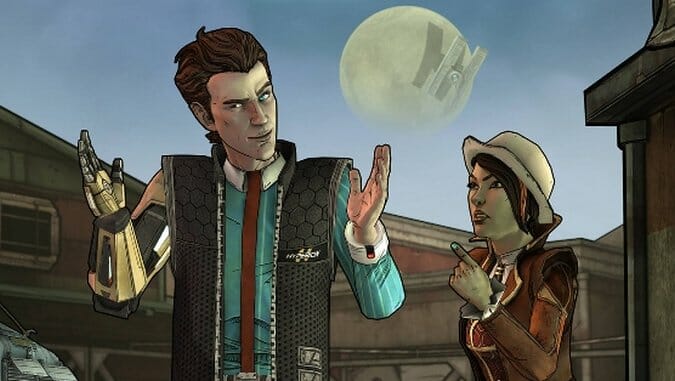Tales from the Borderlands Episode One: Zer0 Sum—Thick as Thieves

Tales from the Borderlands is a fascinating project, an episodic adventure game from the developers of The Walking Dead and The Wolf Among Us that takes place in the same universe as Gearbox Software’s goofy sci-fi shooter. That a developer for critically acclaimed narrative-based games would seek to expand the story of an enjoyable, if somewhat repetitive shooter would be enough to make Tales interesting even if the game was a dud.
The first episode of Tales from the Borderlands manages to make the most of its odd parentage. If it’s an accurate indicator of quality for the rest of the series, then Telltale might turn out to be the best thing to have happened to the denizens of Pandora. The most interesting elements of Borderlands, after all, were the nuggets of stories being told on the outskirts of The Great Loot Hunt: The vaguely tragic relationship between Handsome Jack and Angel. Moxxi and her many husbands. Gruff weapons dealer Marcus’ exploitation of almost any situation to make a buck. As I played through Borderlands 2, I wanted to know about the stories of these folks more than I desired any of the bazillion guns littered through the game’s world.
Tales is not primarily an expansion on these stories but is, instead, a new story centered around two characters: a self-centered, bumbling Hyperion employee named Rhys who’s trying to climb the Hyperion corporate ladder, and a clever con artist named Fiona. The game begins in medias res, with Fiona and Rhys, imprisoned by a masked capturer, taking turns to recount the events that led them to this moment. This leads to some amusing Rashomon style moments where Fiona or Rhys will point out lies in the other’s story, but on the whole the first episode resists the temptation of relying on that cutesy trick too much and tells a straight story about thieves trying to get rich.
The two and a half hours of story in the first episode, focusing almost entirely on the new cast but also featuring more than a handful of references to Borderlands 2, is well-written and hilarious. I found myself chuckling a couple of times through nearly every conversation in the game, laughing loudly other times, and generally enjoying the personalities and quirks of the new cast. While this is mostly a light-hearted affair, there were, surprisingly, several moments where Tales successfully created an emotional tether between me and the characters: I became invested in them and, beyond being curious enough to see where their journeys end, I’m actually worried about what might happen to them in future episodes. Will they pull off a successful heist and lose all their money trying to outwit and screw over one another? Will they outgrow their lust for cash, learn to care for one another, and become better people? There are enough plot developments ostensibly influenced by player choices to suggest that this story could go anywhere. Unpredictability is a rare, exciting prospect when it comes to stories in games.
Fiona and Rhys are interesting and well developed with enough blank space in their respective personalities for the player to have a hand in shaping them. There aren’t really any dramatic life or death choices in Tales like there are in The Walking Dead or Wolf, but that’s probably for the best. The ones that Tales gives us are more interesting than deciding if a fodder character will die at point A instead of point D anyway. For example, no matter what you do, Rhys is always going to come off as a Guybrush Threepwood kind of fool. However, Telltale lets us decide how he handles being the butt of everyone’s jokes. Is he a jerk, or will he bear his indignity with a joke and a smile? We’re shaping small but integral parts of characters in this game, casting our shadows on their souls, as it were.
There’s a lot of talk about “meaningful choices” in videogames and rarely is there an explanation of what that phrase means. For me, “meaningful choices” means that those choices allow the player to build something fascinating or worthy of interest to that player. I find the choices in Tales to be meaningful not in that they’re shaping the world I’m playing in (a la Mass Effect) but that they allow me to determine how Rhys and Fiona react to the situations they find themselves in, how they grow (or don’t grow) as people, and ponder about the kind of people they will become because of my choices. A small act of kindness or charity in Episode 1 might be the difference between a hero and villain in Episode 5. Of course, there’s the probability that that’s not the case at all, and that Rhys and Fiona might remain on the same path no matter what choices I make. However, this aspect of episodic games that people often criticize—that we don’t have the full picture at once—is one that draws me to them. To not know where a story is going for weeks or months at a time is to have the privilege of sitting around wondering and discussing with other folks what’s going to happen to the characters we care about. In a time where most people marathon shows via streaming services or quickly play and talk their games to death within days of purchasing them, it’s a refreshing change of pace.
